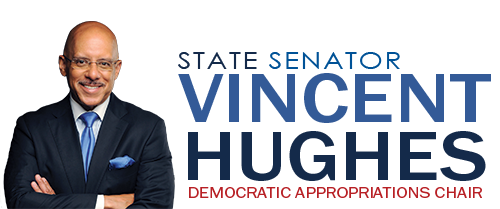New Deal For A New PA
A New Deal for a New Pennsylvania means devoting resources and energy to policy that uplifts the people. Find out what state Senator Vincent Hughes wants to bring to Pennsylvania so it’s people can prosper.
#NewDeal4NewPA

Pennsylvania needs a change. We need comprehensive policy solutions that address the issues our people face.

Pennsylvanians need economic security so they can work with dignity, pay their bills, and take care of their families and plan for a better life.
Pennsylvanians need quality, affordable housing to go home to after a long day’s work. They also deserve world class health care without ridiculously high premiums, hidden costs or inadequate coverage.

Pennsylvania's children deserve a high-quality education, which should start with our preschoolers and continue through college. Pennsylvania should provide the best educational opportunities for its people.

Pennsylvanians need voting reform so that young adults are automatically registered to vote when using state services. Voting should be accessible and inclusive.

Pennsylvanians need healthy environment with clean air, water and land. We must also move forward with the understanding that renewable energy and green jobs are our future.
In short, we need a New Deal for a New Pennsylvania!
New Deal for New PA in Action
Sen. Hughes announces millions in funding, tax credits for affordable housing initiatives in the 7th Senatorial District
Philadelphia — August 13, 2020 — State Senator Vincent Hughes (D-Philadelphia/Montgomery) proudly announced that millions in state funding and tax credits for affordable housing initiatives had been awarded in the 7th Senatorial District Thursday. “I cannot overstate...
Sen. Hughes announces bold, comprehensive plan to address Pa.’s affordable housing crisis through his New Deal for Housing initiative
PHILADELPHIA – January 16, 2020 – State Senator Vincent Hughes (D-Philadelphia/Montgomery) unveiled a bold and aggressive plan to address the state’s affordable housing crisis, alongside members of the Pennsylvania Senate Democratic Caucus, more than 50 housing advocates, and concerned citizens today at the People’s Emergency Center in Philadelphia.
A New Deal for a New PA #NewDeal4NewPA
Sen. Hughes Presents Check to Upper Dublin Township for Innovation Center
Sen. Hughes Announces $17.8M For Senior Housing in West Philly
Senator Hughes and fellow elected officials were at the Community Legal Services of Philadelphia office in North Philadelphia to present a grant of $300,000
Senator Hughes and fellow elected officials were at the Community Legal Services of Philadelphia office in North Philadelphia to present a grant of $300,000
Inglis Methodist Gardens Announcement
Senator Hughes Re-caps the Inglis Methodist Gardens Event
Sen. Hughes In Mantua to Announce $200,000 for Much Need Home Repairs
Sen. Hughes Announces $16.6M Investment in Housing at New Market West
New Deal for New Pennsylvania Legislation
Affordable Housing
Senate Bill 30 – State Housing Tax Credit
According to the Housing Alliance of Pennsylvania, across the Commonwealth, we are faced with a shortage of housing that is available and affordable, especially for households making 30 percent of median family income; and below which equals an annual salary of $22,200 and below. For every 100 low income renter households in PA, there are only 66 affordable rental homes available, and for 100 very low income renter households, there are only 38 affordable units available.
Senate Bill 800 – Establishing a Pennsylvania Community Reinvestment Act
This legislation would establish the Pennsylvania Community Reinvestment Act to provide additional safeguards in the residential mortgage market. The bill would mirror much of the federal CRA but provide additional safeguards to root out racial disparities in lending practices. Specifically, my legislation would require banks demonstrate that race plays no factor in their lending decisions. These disclosures would be public information and provide an additional factor in determining a bank’s compliance with the Pennsylvania Community Reinvestment Act.
Senate Bill 913 – SAFE Housing Trust Fund
The “Survivor-centered, accessible, fair and empowering” (SAFE) Housing Trust Fund will provide much needed funding to increase resources to domestic violence programs, transitional housing programs and permanent housing solutions to better respond to the needs of these victims and survivors. We need to support these strong individuals with real means to leave dangerous situations and ensure they do not end up homeless
Economic Security
Senate Bills 360 & 361 – Poverty Initiative
The second piece of legislation I am proposing requires the Independent Fiscal Office (IFO) to complete a poverty impact analysis on the governor’s proposed budget, the enacted budget and any bill, amendment or joint resolution upon written request of a member of the General Assembly. The poverty impact analysis for the governor’s proposed budget must be completed by May 1 of each year and the review of the enacted budget must be completed within 90 days of enactment.
Senate Bill 785 – Fair Share Tax
Senate Bill 91 – Forward-facing Employment Data
Senate Bill 220 – Increasing the Personal Income Tax Poverty Exemption
This legislation increases the poverty exemption for the Personal Income Tax (PIT) by $1,000 per dependent.
Under the proposal, the current exemption of $9,500 would be increased to $10,500 for an individual and to $34,000 (up from $32,000) for a married couple with two dependent children.
Senate Bill 168 – Increasing the Rural Jobs and Investment Tax Credit
This legislation increases the Rural Jobs and Investment Tax Credit.
Investing in rural Pennsylvania is vital to the economic strength of the Commonwealth. According to the U.S. Census Bureau, 48 of the Commonwealth’s 67 counties are rural. Approximately 27% of the Commonwealth’s population lives in a rural county. The American Community Survey found that 37% of rural households in Pennsylvania had incomes below $35,000.
Senate Bills 519 & 520 – Wage Theft Education and Accountability
This legislation that educates employees about and brings accountability to employers regarding wage theft. The first piece requires the posting of information at all work places regarding wage theft and the second piece prohibits violators of Pennsylvania’s Wage Payment and Collection Law from participating in commonwealth procurement.
Wage theft is the practice of underpaying or failing to pay workers money that they are legally owed. Wage theft comes in many forms; some employers misclassify their workers, denying them pay protections and access to benefits; some pay below the minimum or promised wage; some make illegal deductions or steal tips from tipped employees; while others simply fail to pay for all hours worked or, in extreme cases, do not pay at all.
Health care
Senate Bill 13 – Employee Paid Sick Leave
This legislation known as the “Healthy Employee/Healthy Workplace Act,” would require every employer in this Commonwealth to provide paid sick leave to employees.
Over the past several years, paid sick leave has gained attention as numerous cities across the United States have enacted ordinances mandating paid sick leave. Since 2011 when Connecticut became the first state to require paid sick leave, nine other states and the District of Columbia have enacted paid sick leave laws. Pennsylvania should join those states in promoting healthy employees, healthy workplaces, and healthy families by enacting a paid sick leave law.
Senate Bill 50 – Protecting Insurance Coverage for Individuals with Preexisting Conditions
This legislation prohibits health insurance companies from using an individual’s preexisting medical conditions to deny or exclude coverage under a health insurance policy.
Actions by the Federal court and the Trump Administration have dismantled a popular and important provision of the Affordable Care Act (ACA) that prohibits an insurance company from denying an individual insurance coverage because they have a preexisting health condition. Several States have sought and been approved for a waiver from this requirement and have begun selling insurance policies on the ACA marketplace that deny coverage to individuals with preexisting conditions.
Senate Bill 51 – Protecting the Essential Health Benefits for Insurance Policies sold in PA
This bill will codify the federal essential health benefits (EHB) into state law. Before the ACA imposes EHB, three in five people’s insurance policy did not provide maternity coverage and one in three policies did not cover substance abuse treatment.
Under our proposal, the ten essential health benefits (EHB) currently covered by the ACA would be placed into state law. The benefits our legislation would cover includes: ambulatory patient services; emergency services; hospitalization; maternity and newborn care; mental health and substance use disorder services including behavioral health treatment; prescription drugs; rehabilitative and habilitative services and devices; laboratory services; preventive and wellness services and chronic disease management; and pediatric services, including oral and vision care.
Prohibiting Annual or Lifetime Limits on Health Insurance Policies
This legislation will prohibit health insurance policies within the Commonwealth from imposing either an annual or lifetime limit.
Prior to the passage of the Affordable Care Act (ACA), health insurance companies could impose annual or lifetime limits on coverage for health insurance policies. It is estimated that prior to the federal prohibition on annual and lifetime limits, nearly 102 million Americans nationwide had a health insurance policy that was subject to either an annual or lifetime limit. Once these limits were reached, a policy holder or their family would be required to pay 100% of medical expenses out of pocket. This saddled individuals and families with debt and forced some to declare bankruptcy.
Education
Senate Bill 111 – Pennsylvania Promise
The legislation will remove substantial financial burdens on students and their families and make college more affordable for students attending one of Pennsylvania’s community colleges, state system universities, and state-related institutions.
The Pennsylvania Promise will be administered by the Pennsylvania Higher Education Assistance Agency (PHEAA) and will cover tuition and fees for recent high school graduates attending one of the 14 community colleges and tuition and fees at a state-owned or state-related university for students with a family income of $110,000 or less per year. Students whose family income is $48,000 or less will also be eligible for assistance with costs associated with room and board.
Senate Bill 555 – Public School Building Emergency Repair and Renovation Grant Program
This legislation will address the toxic, unsafe conditions in public school buildings throughout the Commonwealth.
The condition of public school facilities has broad impact on students, teachers and communities — affecting everything from physical health to academic achievement.
Most Pennsylvania public school buildings were built between 1950 and 1959; there are more than 200 Pennsylvania public school buildings built before 1950. Nearly half of those old buildings house students in the School District of Philadelphia. The systems within those buildings — heating, cooling, lighting, electrical, etc. — are broken, inefficient and in desperate need of replacement.
Senate Bill 219 – Health-Related Industries Education Scholarship Program
This legislation amends the School Code to establish the Health-Related Industries Education Scholarship Program.
My legislation creates the Health-Related Industries Educational Scholarship Program. Students who qualify for the program can receive financial assistance to complete their education for the purpose of pursuing an occupation in a health-related industry. The program incentivizes 2-year healthcare programs with a Pay-It-Forward plan and tax credits for businesses that will train/mentor student interns on the job.
Senate Bill 200 – Trauma-Informed Education Initiative
This legislation would establish a new, trauma-informed system of education in Pennsylvania.
Decades of research have shown that for children experiencing trauma, the impact on brain development and function can be dramatic. Children experiencing trauma face an impediment to learning and require focused and proven interventions to overcome those obstacles. Research has also shown that empathetic trauma-informed/trauma-focused policies, procedures and practices will have positive impact on the social-emotional growth of students, on their academic achievement, and on the well-being and effectiveness of the professionals who serve them.
Senate Bill 400 – Pennsylvania Student Higher Education Lending Protection (PA Student HELP) Act
This legislation will comprehensively address the student debt crisis facing countless individuals and families throughout the Commonwealth.
The statistics are staggering. Nationwide, approximately 45 million people owe more than $1.5 trillion in federal student loan debt. In Pennsylvania, more than 1.8 million residents carry student loan debt. The average college graduate with a degree from a Pennsylvania school carried more than $36,000 in debt in 2017, making Pennsylvania first in the nation for student loan debt per capita.
Environment
Senate Bill 917 – Codification and expansion of the Office of Environmental Justice
This legislation will codify and enhance the Office of Environmental Justice within the Department of Environmental Protection.
In 1994, President Clinton directed Federal agencies to take actions to address environmental justice in minority populations and low-income populations. In 1999, DEP developed a statewide Environmental Justice Work Group which recommended the creation of an Environmental Justice Advisory Board and Office within the Department of Environmental Protection (DEP) to address environmental justice issues.
Senate Resolution 83 – Earth Day Resolution
This resolution recognizes the celebration of Earth Day 2019 on April 22nd.
This year marks the 49th anniversary of the first celebration of Earth Day, which was founded by United States Senator Gaylord Nelson of Wisconsin in 1970 to increase public awareness of the world’s environmental problems.
This year’s Earth Day theme is “Protect Our Species.” Studies have shown that species are being eliminated at an alarming rate. The rapid reduction of plant and wildlife populations is directly linked to causes driven by human activity. Many species will disappear before we learn about them or the benefits they bring to our eco-systems and our planet. However, many of our declining, threatened and endangered species can still recover and the rate of extinctions can be slowed.
Election Integrity
Senate Bill 608 – Automatic Voter Registration
This legislation, based on a similar law in Oregon, would essentially change our voter registration system from an “opt-in” system to an “opt-out” system. Under current law, citizens can elect to register to vote (“opt-in”) either electronically or by filling out a voter registration form when they apply for a public benefit, service or license through the Department of Transportation or other state agencies currently authorized to assist with registering voters.
Under my proposal, these agencies would automatically collect an individual’s relevant voting-related information with the application and send it electronically to the Department of State and to the counties for purposes of registering the voter. Prior to completing the registration, a voter would receive a notice allowing them to select a political party affiliation or to decline registration (“opt out”). If the individual does not “opt out” within 21 days, they will be added to the voter rolls.
Senate Resolution 233 – Resolution urging Congress to enact the election security recommendations from the United States Senate Select Committee on Intelligence
This resolution resolution urges Congress to enact the recommendations from the United States Select Committee on Intelligence report on “Russian Active Measures Campaigns and Interference in the 2016 U.S. Election.”
On July 25, 2019, the U.S. Senate Select Committee on Intelligence issued a report on Russian interference in the 2016 presidential election. Their report found that the Russian government conducted an “unprecedented level of activity against state election infrastructure.”
Other #NewDeal4NewPA legislation
Senate Bill 930 – Ending prison gerrymandering
This legislation prohibits “prison gerrymandering” in the Commonwealth of Pennsylvania.
Prison gerrymandering occurs when an inmate is counted by the census as a resident in their “usual residence,” which is the district of the prison in which he or she is incarcerated, as established by the first census in the Act of March 1, 1790. However, there are exceptions in the “usual residence” application. For instance, individuals in the process of moving, in rehabilitation or group facilities, or attending boarding school, were still counted in their home district or county. Therefore, the process of counting prison inmates should mirror this process throughout the Commonwealth since inmates will return to their home districts at the end of their sentence.
Senate Bill 222 – Workplace Freedom Act
This legislation that strengthens collective bargaining in the Commonwealth.
The reality is that a strong and growing middle class has always been the fuel for our economy and it is the tide that lifts all boats. Over the past century, working Pennsylvanians saw greater increases in their standard of living during periods of increased unionization. Corporate special interests are funding anti-worker campaigns in order to weaken unions. The result of these efforts will likely negatively impact the wages, healthcare, workplace safety, and retirement of our teachers, police officers, firefighters, nurses and countless other government workers who serve and protect us. This divide and conquer economic warfare on the middle class must be stopped.
Senate Bill 671 – Small Business Fee Exemption
This legislation known as the “Small Business Fee Exemption Act” would reduce or eliminate business startup fees for small businesses.
The week of May 5 through 11 is “Small Business Week” in Pennsylvania. Small businesses are the economic backbones of our communities. According to Pennsylvania Small Business Development Centers, there are nearly one million small businesses in Pennsylvania. Small businesses across the Commonwealth account for nearly 50% of the private sector workforce.
Senate Bill 672 – Small Business tax-deferred savings accounts
This legislation creates Small Business tax-deferred savings accounts.
Every year since 1963, the President of the United States has issued a proclamation announcing National Small Business Week, which recognizes the critical contributions of America’s entrepreneurs and small business owners. The week of May 5 through May 11 is “Small Business Week” in Pennsylvania. Small businesses are the economic backbones of our communities. According to Pennsylvania Small Business Development Centers, there are nearly one million small businesses in Pennsylvania. Small businesses across the Commonwealth account for nearly 50% of the private sector workforce.


